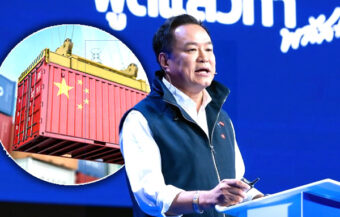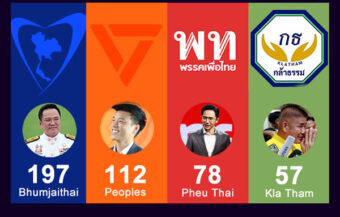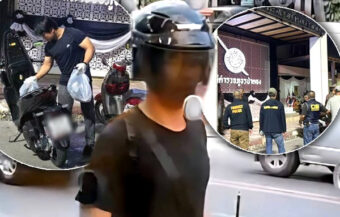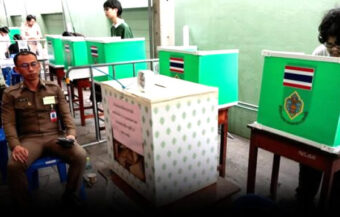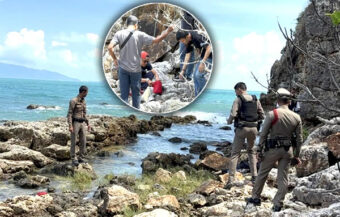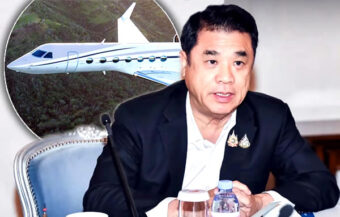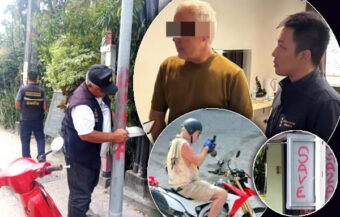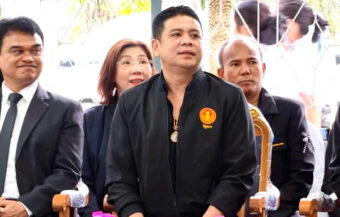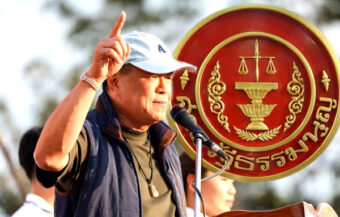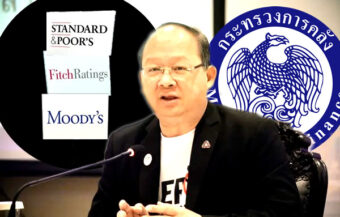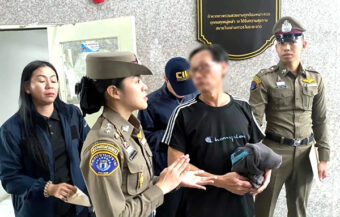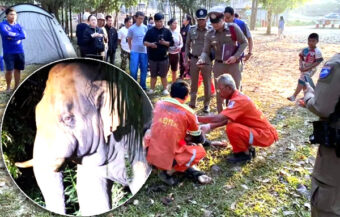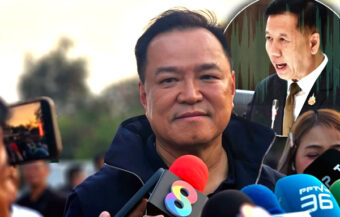Malaysian PM Anwar Ibrahim works through the weekend to salvage the Thailand-Cambodia peace pact, scrapped by Thai PM Anutin after border blast, soldiers’ injuries and rising tensions. Trade talks with the US continue uninterrupted.
Malaysian Prime Minister Anwar Ibrahim worked through the weekend to salvage and revive the peace deal between Cambodia and Thailand signed with US President Donald Trump on October 26th in Kuala Lumpur, following Prime Minister Anutin Charnvirakul’s declaration on Tuesday evening—issued while meeting troops on the Thai-Cambodian border in Sisaket—that peace with Cambodia was over. At the same time, Commerce Minister Suphajee Suthumpun confirmed that talks with the United States on the US-Thai trade agreement are moving ahead without interruption and advancing toward finalisation.
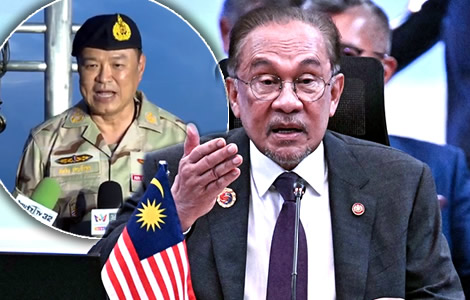
Thai Prime Minister Anutin Charnvirakul declared on Tuesday evening that peace with Cambodia was over. He was speaking on Phu Makhuea in Kantharalak District, Sisaket Province, surrounded by his Minister of Defence, Nattapol Nakpanit and soldiers. Furthermore, he also confirmed the suspension of the October 26 peace plans with Cambodia.
The announcement ended weeks of quiet diplomacy. It also signalled a sharp change in Thailand’s approach to the ongoing border tensions with Cambodia. In short, its patience was at an end.
Indeed, it was the seventh such landmine explosion since June, each time causing a Thai soldier to lose part of his leg.
Thai Prime Minister ends peace with Cambodia after latest border landmine incident injured four soldiers
By the weekend, Malaysian Prime Minister Anwar Ibrahim was reported as trying to mend ties. His efforts followed rising concern over the fallout from Anutin’s declaration. They also came after reports that Anutin had already considered an adverse reaction from the United States. Those concerns centred on trade talks presently being negotiated toward a final settlement. It has been thought that a rejection of the Trump peace plan would imperil the US trade deal.
However, despite the political strain, Commerce Ministry official Suphajee Suthumpun said negotiations with US representatives were still progressing.
The breakdown of the peace plan began after four Thai soldiers were injured on Monday morning. The blast occurred in the Huai Ta Maria area of Kantharalak district in Sisaket province. One soldier lost his foot. The attack immediately increased pressure on all parties involved in the October 26 framework. It also undermined earlier attempts to stabilise the frontier.
After the incident, Anwar disclosed that he had spoken with the Thai and Cambodian prime ministers. He repeated his position that the dispute must be resolved peacefully. He said both leaders reaffirmed their commitment to a peaceful outcome. Malaysia, he added, was ready to serve again as mediator.
Malaysian Prime Minister engages with Thailand and Cambodia to restore peace after incident
Moreover, Anwar’s statement echoed his post from Thursday, November 13, 2015. In that message, written directly by the Malaysian Prime Minister and ASEAN Chair, he addressed an exchange of fire along the Thai-Cambodian border.
Anwar Ibrahim said he had spoken with Cambodian Prime Minister Hun Sen and Thai Prime Minister Anutin Charnvirakul. He reported that both sides reiterated their commitment to peace. He also cited the Kuala Lumpur Peace Declaration as a guiding document.
Anwar stated then that the two leaders responded positively. He noted that they reaffirmed their commitment to a peaceful resolution. The Malaysian PM also said the response aligned with the understandings agreed in Kuala Lumpur. He added that friendship and ceasefire arrangements must be strengthened under that agreement. He further stressed Malaysia’s readiness to continue its role as mediator.
According to Anwar, both prime ministers expressed appreciation for Malaysia’s position. They recognised Malaysia’s responsibilities as ASEAN Chair. They also acknowledged its role as a close neighbour with an interest in regional stability. Anwar said the priority was restoring stability along the border. He added that the safety of populations on both sides depended on it.
Anwar recalls past assurances and Malaysia’s continuing mediator role to stabilise the border region
The latest Thai announcement revived attention to the Kuala Lumpur framework. It also drew new focus to Anwar’s weekend interventions. The reference to potential US displeasure added another element to the crisis.
Reports indicated that Thailand had anticipated an adverse American reaction to any disruption of ongoing trade discussions. However, Suphajee insisted that negotiations with US officials were still moving forward. Her comments confirm that trade talks for now continue despite the deteriorating security climate.
Meanwhile, the injuries to the Thai soldiers highlight the fragility of the border situation. The blast occurred in a known tension zone. It was the trigger for Anutin declaring the peace process over. The timing placed new stress on the October 26 deal. It also forced Malaysia to re-engage with both governments.
Notably, actions promised under the pact are now suspended. The pact, although not a formal treaty, was a blueprint for peace now and in the future. For instance, it anticipated LIDAR technology-backed border delineation between the two countries. All of that is now binned.
As a result, Anwar focused his communications on keeping dialogue open. He highlighted the commitments made under the Kuala Lumpur Peace Declaration. He also emphasised the need to maintain contact among the three governments. His remarks reinforced the record of previous talks and the established dispute-resolution mechanisms.
Thailand’s rejection forces Malaysia to re-engage and reaffirm the spirit of Kuala Lumpur accord
Furthermore, his statement placed Malaysia’s diplomatic role back into the spotlight. It reaffirmed Malaysia’s willingness to continue mediating. It also reminded both countries of their earlier pledges. The message pointed directly to the commitments made under the Kuala Lumpur Declaration.
Anwar urged Thailand and Cambodia to continue demonstrating determination and courage. He said both countries must restore border stability. Significantly, he pointed out that lasting peace required sustained cooperation. His comments reflected the concerns raised in earlier ASEAN discussions on border incidents.
The incident in Huai Ta Maria, combined with the suspension of the peace plans, increased diplomatic urgency. The conversations reported by Anwar showed that communication lines remained open. The continued trade talks with the United States added a parallel track to the unfolding situation. The combination of border violence and economic negotiations shaped the broader environment.
As tensions still exist, regional officials are watching developments closely. The fallout from Anutin’s declaration may yet be seen. This, of course, all depends on the continued diplomatic exchanges.
Malaysia highlights diplomatic role and urges both countries to maintain dialogue and stability
The weekend statements from Anwar and Suphajee outlined two issues: border security and international trade. Both fronts were linked by US President Donald Trump at the end of July when he halted a hot war on the border. Both issues, therefore, continue to impact relations among Thailand, Cambodia, Malaysia, and the United States.
Undoubtedly, many conservatives and other elements in Bangkok are piqued by this. Indeed, there is a body of opinion that calls for all-out confrontation with Cambodia, no matter what the cost.
The situation now rests on whether the commitments cited by Anwar can be translated into action. The injury of the four soldiers remains a critical development. In particular, this involved the use of new RMN-2 Russian landmines, with Thai intelligence suggesting the mines were planted just days before the explosion. In short, this was a provocative act designed to undermine peace.
Fear of renewed hostilities. Thailand scraps Trump’s peace deal with Cambodia. ‘Peace is over’ says PM
Prime Minister Anutin signs accord with Cambodia, witnessed by US President Trump, in Kuala Lumpur
The suspension of the October 26 plan, therefore, stands as the immediate consequence. The response from regional leaders highlights the stakes involved. Analysts suggest that what happened on Monday morning was designed to do away with the peace process inaugurated by President Trump on October 26.
Critics of Cambodia in Thailand suggest that the Hun Sen regime and some elements in Thailand would prefer the focus to be on a Thai-Cambodian border conflict.
This would be in contrast to rising public attention in Thailand and around the world, focused on the scam compounds and the threat posed by rampant illegality, particularly to Thailand and countries victimised by the rising online fraud campaign.
Join the Thai News forum, follow Thai Examiner on Facebook here
Receive all our stories as they come out on Telegram here
Follow Thai Examiner here
Further reading:
Trump brokered peace pact between Thailand and Cambodia suspended after landmine attack this week
Prime Minister Anutin signs accord with Cambodia witnessed by US President Trump in Kuala Lumpur
Trump to oversee ground breaking new deal between Thailand and Cambodia on Saturday to map border
High powered, secretive meeting chaired by PM agrees robust action against Cambodian networks
Thailand and Cambodia face danger from ‘Dragon Head’ the Chinese mafia leader behind the scams

